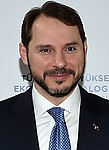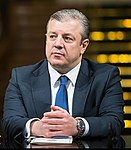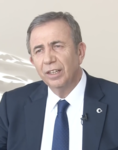Directory of Vardana: Difference between revisions
mNo edit summary |
|||
| Line 82: | Line 82: | ||
==See also== | ==See also== | ||
*[[List of heads of state of Vardana]] | *[[List of heads of state of Vardana]] | ||
{{Heads of state of republics (Ajax)}} | |||
[[category:Vardana]] | [[category:Vardana]] | ||
Revision as of 19:58, 12 February 2022
| Executive Directory of Vardana | |
|---|---|
| Տեղեկատու (Vardanan) | |
 Cockade of the Republic of Vardana | |
| Style | His/Her Excellency (in international correspondence) |
| Type | Directorial government |
| Seat | Tigranaberd Palace, Hrazdan |
| Appointer | Direct popular vote |
| Term length | Four years, variable renewable |
| Constituting instrument | Second Republic Constitution |
| Precursor | Paramount Leader of Vardana State President of Vardana President of the Regency of Vardana |
| Formation | 11 July 1985 |
The Directory of Vardana (Vardanan: Տեղեկատու) is the nine-member committee that has governed the Third Vardanan Republic since the signing of the constitution, on 18 June 1985. Collectively, the Directory serves as the head of state and of government of Vardana.
The entire Directory is responsible for the federal government of Vardana, overseeing the administration of the nation. By direction of the constitution, all directors are of equal status; however, since 1992 the Directory has appointed one of its membership to serve as the First Secretary. The First Secretary, as first among equals, often fulfills the representative obligations traditionally carried out by a single head of state in other nations.
History
1983 constitution
The 1983 constitution was drafted during a constitutional convention following an auto-coup led by Arman Boghossian and a group of Hvrat reformists. The convention was chaired by future, and last, Paramount Leader Boghossian. The constitution was drafted over the course of five months, and was adopted in July 1983, approved by national referendum in 1984. The constitution came into effect on 11 July 1985, exactly two years after the initial adoption. Article III called for the creation of an executive directory, partially inspired by the Daitoan model, and deals with the function and duties of the Directory.
Article III, section 1 describes the Directory as the "supreme executive power" of the nation. The Directory is to consist of 12 members, one elected from each of Vardana's 12 provinces. The constitution sets a directors term to 4 years, and provides for a baseline eligibility to stand for election. However, term limits have been imposed by provincial constitutions or charters in 7 provinces (Armavia, Bayazet, Eremos, Euneos, Kajaran, Mysia, and Dardalona). Directorial seats are divided into 4 electoral classes, allowing for the election of 3 seats every year.
- Class 1: Kajaran, Mysia, and Nakorzan.
- Class 2: Ayrum, Cilixia, and Dardalona.
- Class 3: Eremos, Euneos, and Thrassa.
- Class 4: Armavia, Bayazet, and Kordaya.
Section 2 granted the Directory the power to:
- appoint judges, attorney generals, military officers, and other officers;
- fill vacancies resulting from death, resignation, impeachment, or other disqualification;
- correspond with foreign nations;
- serve as presiding officers in cases of impeachment;
- grant pardons and reprieves;
- ensure the enforcement of laws passed by the Assembly and signed by Directory;
- veto legislation;
- serve as commander-in-chief of the armed forces, or to nominate one among themselves to serve as sole commander-in-chief in times of crisis;
- etc.
Meeting place
The constitution provides that the Directory is to be in session simultaneously with the National Convention. However, in practice the Directory sits year-round with no formal sessions. Directory meetings, and offices, are held at Tigranaberd Palace, in Kajnadzor.
Directors
Eligibility
The Constitution of Vardana sets 4 major qualifications to become a Director. To serve as Director, one must:
- be a citizen of Vardana
- be at least 30 years old
- be a resident for the last 10 years
- not be married to a non-citizen spouse
Election and term limits
Directorial elections are staggered with 3 directors elected annually. Elections are regulated and held by provincial electoral commissions, in elections featuring universal suffrage. Provincial charters vary on method of election, but many utilize a two-round system or first past the post. Newly elected directors are sworn in a full month after their election by the President of the National Convention.
Term limits do not exist at the national level, though many provinces have enacted term limits within their own jurisdictions to restrict offices. The following provinces have a 2 term limit, allowing for no more than two consecutive terms (allowing individuals stand for election after sitting out an election cycle): Armavia, Bayazet, Kajaran, Eremos, Euneos, and Perateia. Mysia has a hard 3 term limit, while the provinces of Ayrum, Cilixia, Kordaya, Nakorzan, and Thrassa have no restrictions on consecutive terms.
First Secretary
The First Secretary serves as the presiding officer of the Directory, and undertakes representative duties typically associated with a single head of state. The office was established in 1992 out of Directorial gridlock and the need for a presiding officer not provided by the constitution. The First Secretary is elected from among the members, originally intended to be the most senior member of the Directory, however this has rarely been the case and instead the First Secretary is the leader of the directory's majority. The First Secretary also serves as the functional commander-in-chief of the armed forces. The current First Secretary is Anastas Barkhudar, of the Radical Party, who has presided over the 26th through 37th Directorates.
The constitutionality of the First Secretary has often been debated among constitutional scholars and legal analysts in Vardana. The constitution does not provide for a presiding officer of the directory and instead relies on all directors to collectively undertake functions of the head of state and government. Some constitutional scholars have noted that the creation of the First Secretary can be explained through the Directory's exclusive power to appoint other officers or fill vacancies. However, opponents widely criticize this view and have called for the position to be abolished or, in a minority view, lawfully created via a constitutional amendment to limit its potential powers and influence over the Directory as a whole.
Current membership
As of July 2021 the incumbent Directors are:


















